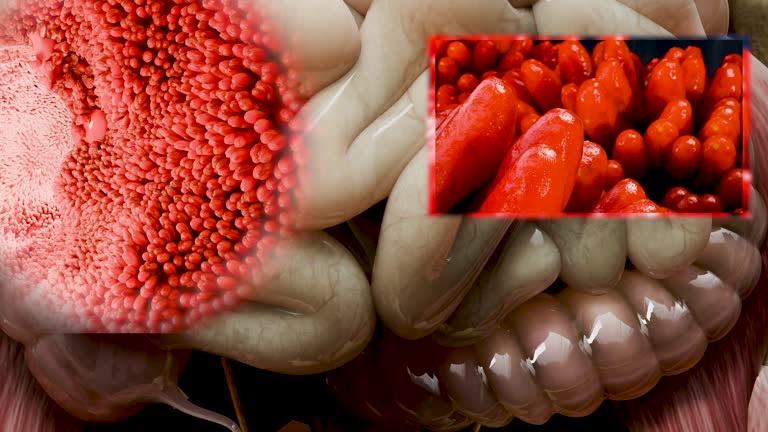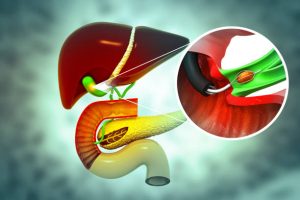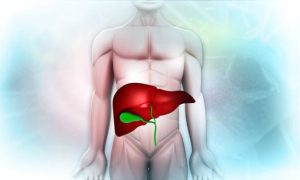
intestinal villi, Red microvilli in a intestinal tract. close-up, Microbiology, anatomy, biology, science, medicine, medical and healthcare concepts, Digestive system, epithelial cells, 3D Render
Celiac Disease
What is Celiac Disease?
Celiac disease is a chronic autoimmune disorder that occurs in genetically predisposed individuals where the ingestion of gluten leads to damage in the small intestine. Gluten is a protein found in wheat, barley, and rye. When people with celiac disease consume gluten, it triggers an immune response that damages the lining of the small intestine, leading to malabsorption of nutrients.
Types of Celiac Disease:
- Classical Celiac Disease: Characterized by classic gastrointestinal symptoms, such as diarrhea and weight loss.
- Non-Classical Celiac Disease: Symptoms may be less obvious, including neurological issues or skin problems.
- Silent Celiac Disease: No apparent symptoms, but intestinal damage occurs.
- Potential Celiac Disease: Individuals have a genetic predisposition and elevated antibodies but no intestinal damage yet.
Main Causes of Celiac Disease:
- Genetic Factors: Inherited genetic markers, particularly HLA-DQ2 and HLA-DQ8.
- Environmental Triggers: Consumption of gluten, gastrointestinal infections, and changes in gut bacteria may trigger the disease in genetically predisposed individuals.
- Immune System Response: The immune system mistakenly attacks the small intestine lining upon gluten ingestion.
Signs and Symptoms of Celiac Disease:
- Gastrointestinal Symptoms:
- Chronic diarrhea
- Bloating and gas
- Abdominal pain and cramps
- Weight loss
- Fatigue
- Non-Gastrointestinal Symptoms:
- Iron-deficiency anemia
- Osteoporosis or osteopenia
- Dermatitis herpetiformis (itchy skin rash)
- Neurological symptoms (numbness, tingling, or balance issues)
- Reproductive issues (infertility, miscarriages)
- Dental enamel defects
Risk Factors for Celiac Disease:
- Family History: Having a first-degree relative (parent, sibling) with celiac disease increases the risk.
- Genetic Predisposition: Carrying the HLA-DQ2 or HLA-DQ8 genes.
- Other Autoimmune Disorders: Increased risk in individuals with type 1 diabetes, autoimmune thyroid disease, or autoimmune liver disease.
- Age: Most commonly diagnosed in childhood or early adulthood, but it can occur at any age.
How to Prevent Celiac Disease:
Currently, there are no known preventive measures for celiac disease, as it is primarily genetic. However, early diagnosis and strict adherence to a gluten-free diet can help manage symptoms and prevent complications.
How Celiac Disease is Diagnosed:
- Blood Tests: Detect specific antibodies (tTG-IgA, EMA, DGP) indicating an immune response to gluten.
- Genetic Testing: Testing for HLA-DQ2 and HLA-DQ8 genes can help confirm susceptibility.
- Endoscopy and Biopsy: A small intestine biopsy may be performed to assess damage to the intestinal lining.
Treatment for Celiac Disease:
- Gluten-Free Diet: The primary treatment involves strictly avoiding all sources of gluten, including wheat, barley, rye, and their derivatives.
- Nutritional Supplements: May be necessary to address deficiencies in vitamins and minerals (e.g., iron, calcium, vitamin D).
- Regular Follow-ups: Monitoring for dietary compliance and assessing for nutritional deficiencies through blood tests.
Home Remedies for Celiac Disease:
While there are no specific home remedies to treat celiac disease, following a gluten-free diet and incorporating nutrient-rich foods can help manage the condition:
- Whole Foods: Focus on naturally gluten-free foods like fruits, vegetables, lean meats, fish, eggs, dairy, legumes, nuts, and seeds.
- Gluten-Free Grains: Include quinoa, rice, corn, and gluten-free oats.
- Probiotics: Consider taking probiotics to support gut health, but consult a healthcare provider first.
Ayurvedic Medicine for Celiac Disease:
- Triphala: A blend of three fruits known to support digestive health and may aid in nutrient absorption.
- Amla (Indian Gooseberry): Known for its high vitamin C content and antioxidant properties, which can help strengthen the immune system.
- Ginger: May aid digestion and reduce inflammation in the gut.
- Turmeric: Has anti-inflammatory properties that may help in managing gut health.
Precautions:
- Always read labels for gluten content in processed foods and avoid cross-contamination.
- Be cautious when dining out; communicate dietary restrictions clearly to restaurant staff.
- Consult a dietitian for guidance on maintaining a balanced, gluten-free diet.
Self-Care Tips:
- Keep a food diary to track symptoms and identify potential triggers.
- Educate yourself and family members about gluten-containing foods.
- Join a support group for people with celiac disease for shared experiences and resources.
- Regularly check in with healthcare providers for follow-up testing and nutritional assessments.
Conclusion:
Celiac disease is a serious autoimmune condition that requires lifelong adherence to a gluten-free diet to prevent complications and promote health. Early diagnosis and proper management can help individuals lead healthy and fulfilling lives.
Disclaimer:
The information provided here is for educational purposes only and should not replace professional medical advice. Consult a healthcare provider for proper diagnosis and treatment.
Additional Tips:
- Research gluten-free products and brands to make informed choices.
- Explore gluten-free recipes and meal planning to maintain a varied diet.
- Stay informed about the latest research and developments related to celiac disease and gluten intolerance.








